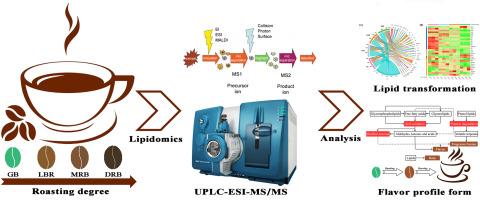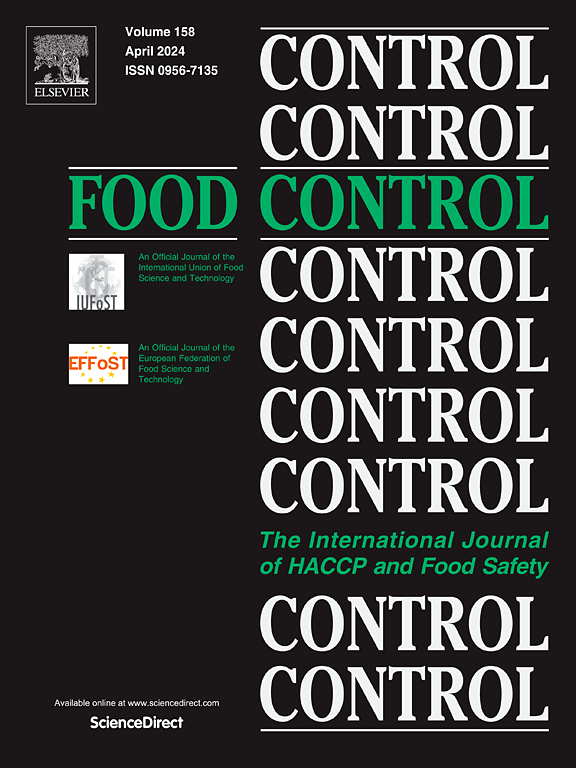Quantitative lipidomics reveals the effects of roasting degree on arabica coffee beans lipid profiles
IF 5.6
1区 农林科学
Q1 FOOD SCIENCE & TECHNOLOGY
引用次数: 0
Abstract
Lipids in coffee beans undergo morphological changes and migration during the roasting process, but the impact of roasting intensity on lipid profiles remains unclear. The lipidomics characteristics of coffee beans with different degrees of roasting (unroasted green beans, light roast, medium roast, and dark roast) were compared using ultra performance liquid chromatography-electrospray ionization-tandem mass spectrometry (UPLC-ESI-MS/MS). A total of 571 lipid metabolites were identified, encompassing 25 species of fatty acyls (FA), 142 species of glycerophospholipids (GP) across 12 subclasses, 42 species of sphingolipids (SP) across four subclasses, 360 species of glycerolipids (GL) across ten subclasses, and two species of prenol lipids (PR). GL content was found to be the highest, followed by FA and GP. Through multivariate analysis, 160 lipids were identified that exhibited significant differences among beans with different degrees of roasting. GP content was significantly influenced by the degree of roasting (p < 0.05), with diverse dynamic evolution observed through K-means cluster analysis. These findings have important implications for understanding lipid transformation and its effect on the flavor profile during coffee roasting.

定量脂质组学揭示烘焙程度对阿拉比卡咖啡豆脂质特征的影响
咖啡豆中的脂质在烘焙过程中会发生形态变化和迁移,但烘焙强度对脂质特征的影响仍不清楚。本研究采用超高效液相色谱-电喷雾串联质谱法(UPLC-ESI-MS/MS)比较了不同烘焙程度咖啡豆(未烘焙青豆、轻度烘焙、中度烘焙和深度烘焙)的脂质组学特征。共鉴定出 571 种脂质代谢物,包括 25 种脂肪酰基 (FA)、12 个亚类中的 142 种甘油磷脂 (GP)、4 个亚类中的 42 种鞘脂类 (SP)、10 个亚类中的 360 种甘油脂类 (GL) 和 2 种前酚脂类 (PR)。发现甘油三酯含量最高,其次是脂肪酸和 GP。通过多元分析,160 种脂质在不同烘焙程度的豆子中表现出显著差异。GP 含量受焙烧程度的影响很大(p < 0.05),通过 K-means 聚类分析观察到了不同的动态演变。这些发现对于了解咖啡烘焙过程中的脂质转化及其对风味的影响具有重要意义。
本文章由计算机程序翻译,如有差异,请以英文原文为准。
求助全文
约1分钟内获得全文
求助全文
来源期刊

Food Control
工程技术-食品科技
CiteScore
12.20
自引率
6.70%
发文量
758
审稿时长
33 days
期刊介绍:
Food Control is an international journal that provides essential information for those involved in food safety and process control.
Food Control covers the below areas that relate to food process control or to food safety of human foods:
• Microbial food safety and antimicrobial systems
• Mycotoxins
• Hazard analysis, HACCP and food safety objectives
• Risk assessment, including microbial and chemical hazards
• Quality assurance
• Good manufacturing practices
• Food process systems design and control
• Food Packaging technology and materials in contact with foods
• Rapid methods of analysis and detection, including sensor technology
• Codes of practice, legislation and international harmonization
• Consumer issues
• Education, training and research needs.
The scope of Food Control is comprehensive and includes original research papers, authoritative reviews, short communications, comment articles that report on new developments in food control, and position papers.
 求助内容:
求助内容: 应助结果提醒方式:
应助结果提醒方式:


